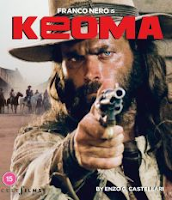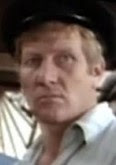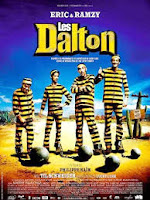Annuario del Cinema NEWS
Directed and starring Claudio Del Falco, “Django
Undisputed” is streaming on Django Western and Full Action, the channels
dedicated to adrenaline-pumping cinema available on Prime Video Channels,
thefilmclub.it and TIMVISION.
After the action movies “Iron Fighter” and “The Martial
Avenger”, the "Italian Van Damme" pays homage to E.B. Clucher (Enzo
Barboni) and his two films starring Trinity/Terence Hill by directing and
starring in a feature film whose goal is to bring back to the cinema the
unmistakable atmosphere of spaghetti westerns, in order to combine the typical
Italian tradition with a modern and engaging narrative.
“Django Undisputed” tells the story of Django, a man
determined to restore order to a village in the Wild West oppressed by violence
and crime. Together with his brother, Django finds himself facing the cruel
Tomas in a duel to the death to save their community and protect his mother
Serena, owner of a brothel, from the tyranny of the outlaws.
Del Falco himself plays Django, while the latter's
brother, Tomas and Serena own the faces of Fabio Romagnolo, Italian IFBB PRO
body building champion here at his film debut, international star Tomas Arana
and Anna Rita Del Piano, within a rich cast including Michael Segal, Mauro
Aversano, Francesca Giuliano, Ciro Buono and Clara Guggiari, with the
participation of Massimiliano Buzzanca and former Miss Italy Nadia Bengala. In
addition, in the role of Django's father we find Ottaviano Dell'Acqua, a historic
presence of the legendary films that starred Bud Spencer and Terence Hill.
First “Dango” Western Original, therefore, “Django
Undisputed” marks a further ambitious step in the filmography of Del Falco,
who, always interested in bringing the genre back into the context of Italian
film production, aims this time to dust off the spaghetti western, now
forgotten for too long on our sets.
Trailer
link: https://www.youtube.com/watch?v=-2F7x2ilSXM
Django Undisputed – International title
A 2024 film production [Saturnia Pictures, One
Seven-Movies, Roswellfilm (Rome)]
Producers: Giuseppe Milazzo Andreani, Salvatore Alongi,
Claudio Callegari
Director: Claudio Del Falco
Story: Claudio Del Falco
Screenplay: Claudio Del Falco
Cinematography: Matteo de Angelis [color]
Music: Simone Cilio
Running time: 90 minutes
Story: Django, a man determined to restore order to a
Wild West village oppressed by violence and crime. Together with his brother,
Django finds himself facing Thomas in a duel to the death to save their
community and protect his mother Serena, owner of a brothel, from the tyranny
of the outlaws.
Cast:
Django – Claudio Del Falco
The King - Tomas Arana
Frankie - Ottaviano Dell'Acqua
Clara - Clara Guggiari
Serena - Anna Rita Del Piano
Tomas - Michael Segál
Francy - Francesca Giuliano
Emma - Vanessa Fois
Dana - Dana Ungureanu
Mortimer: Piero Olivieri
Il Moro - Ciro Buono
The Mexican - Mauro Aversano
Cowboy’s wife - Nadia Bengal
Cowboy's daughter - Karol Battista
Japanese - Gabriele Mallimaci
Django’s brother - Fabio Romagnolo
Sheriff - Massimiliano Buzzanca
Card players - Vincenzo Ferrante, Giandomenico Morello
Old Cowboy – Ferdinando Di Virgilio
Emporium owner - Bon Rayner (Roberto Piccari)
Innkeepers - Valerio Rota Vega (Benedetto Lo Monaco),
Aurora Panetta
Inn patrons - Michele Mariotti, Matteo Ostolani, Didier
Methivier (Raoul Akrassay)
Bartender: Giovanni Marino
Pianist - Francesco Censi
Grinta - Giovanni Bufalini
Groom - Tony Scarf
Prostitutes - Clara Guggiari, Francesca Maria Giuliano,
Vanessa Fois, Elena Daniela
Ungureanu
Tomas’ henchmen – Franco Grossi, Pasquale Guerrisi, Vanni
De Simone, Cesare
Montebovi,
Stefano Tricarico, Fabio Massimi, Simona Romani, Chiara Chiappini,
Stefano
Tricarico
Saloon girls - Camilla Pizzo, Camilla Abballa, Jeanette
Aparre, Gloria Muti, Franca
Maria Muccari
Saloon patrons - Massimo Di Marco, Alessandro Cunsolo
Bandits - Mauro Del Vecchio, Mauro Canavese
Tarantino - Andrea Saolini
Clint - Emiliano Ferrera
Bud Spencer - Fabio Celani
Stunt coordinators: Mauro Aversano, Emiliano Novelli
Stunts: Andrea Andreuzzi, Lorenzo Buran, Tiziano
Carnevale, Giandomenico Morello, Michael Segál



















































